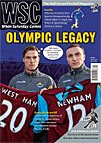 Darlington’s white elephant has turned into a cautionary tale. Owen Amos explains plans to return to something more modest
Darlington’s white elephant has turned into a cautionary tale. Owen Amos explains plans to return to something more modest
When lower-league clubs discuss moving grounds, there’s one thing they know: whenever they go and wherever they go, they don’t want to “do a Darlington”. This means moving to a new ground, then barely filling one tenth of it. A quick Google search shows fans of Gillingham, Hartlepool and Rotherham, among others, have used it. But soon, the phrase might – just might – lose its meaning.
